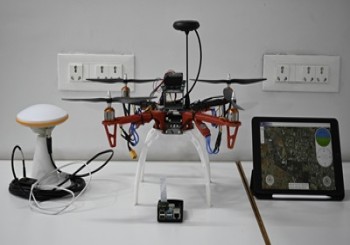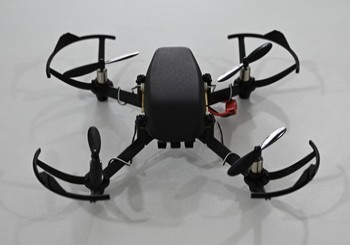Learn Design, Assembly, Maintenance and Repair of Agricultural Drones.
Build, Operate and Maintain a Drone from Scratch by Assembling all the Components.
Course Highlights
- Flexible Schedule
- Hands-on Learning
- Comfortable and Safe Learning Environment
- Placement / Self-Employment Assistance
- Certificate of Training
- Minimum 1 Project
- 2 Assignments
- Beginner Friendly (No prior Technical Knowledge Required)
- 6 weeks, 12hrs/week, 4hrs/day, Alternate Days (flexible schedule)
- Hindi / English - Hinglish
Why Drones?
Drones are becoming popular for many tasks that were can be done remotely. Photography with drones is the most popular. But drones can also be used in many other areas. Other than Photography drones are most popular in Defence. They are also being used in Agriculture, in land mapping, in delivery of goods from one place to the other, etc. This course will help you understand how to assemble and repair a drone.
-
Be A Part Of The Ever Evolving Industry That Serves Billions!
-
Learn Skills Like Calculations, Design, Fault Detection, Etc.
-
Better Prepare For Undergrad Competitions Like KPIT Sparkle, Texas Instruments Innovation Challenge, SPEC-FEST, etc
-
A Good Starting Point For Higher Studies and R&D
Roles in Industry
One of the core jobs in Drones Industry is related to Assembly, Maintenance and repair of Drones. You can work in the following roles with Drone skills
- Drone Maintenance Engineer
- Drone Assembly Technician
- Drone Operator
- Drone Designer
- Robotics Technician
How will your Training Work?
- Basic Concepts: Online / Offline Training to explain basic concepts
- Test Yourself: Test your knowledge through quizzes and module tests at regular intervals
- Hands-on practice: Work on actual hardware. Practice on working models
- 1:1 doubt resolution: Get all your doubts / queries resolved by experts through online / in-person 1:1 interaction
- Final Exam: Complete your training by taking the final practical exam
- Get Certified: Get certified by TCoE upon successful completion of training
Course Structure
- Intro to Drones and Drone market
- Introduction of equipment’s and tools used
- Flight fundamentals
- Operating a drone using a simulator
- Drone design basics
- Drone assembly
- Drone Calibration
- Drone Testing
- Drone Repair
Fee Structure
- Rs. 12,000/-
- Easy EMI options*
- Build Strong Profile for Jobs and Higher Studies
- Apply for Scholarship
Other Related Courses
Frequently Asked Questions
Course Curriculum
Drones and Robots are either remote-controlled OR autonomous machines that fly or move on the ground and are used for various applications where it is difficult for humans to physically go. Drones are used for various applications like aerial photography, agricultural pesticide spraying, Terrain mapping, delivering medical supplies or food supplies during natural disasters, etc. Robots are used for various applications like logistics management, border surveillance and defence, volcanic exploration, exploration of mines, and exploration of other planetary surfaces and moons. Robots are also extensively used in Industrial Automation. Learning about Drones and Robots is important because they are being extensively used in modern Industry and many other fields and offer many job opportunities.
Drones / Robotics courses at TCoE teach you about the different parts involved in making Drones / Robots, how to assemble different types or Drones or Robots, how to find faults in these machines, and how to operate them for various uses.
- Drones and Robotics Software Engineer
- Drones and Robotics Hardware Engineer
- IoT Developer
- Drone Pilot: Fly drones for various tasks.
- Agriculture Specialist: Help farmers with drone data.
- Search and Rescue: Use drones for finding people.
- Mapping and Surveying: Make maps with drones.
- Construction and Engineering: Check building sites.
- Environmental Work: Monitor nature with drones.
- Media and Movies: Use drones in film and TV.
- Safety Jobs: Work in police or firefighting.
- Delivery and Shipping: Use drones/robots for deliveries.
- Start a Business: Begin your drone/robotics company.
- Teaching: Teach others about drones/robotics.
- Technology Research: Improve drone/robotics tech.
Online courses are only helpful in theory. They do not offer the experience of hands-on practice and the confidence to work on your own. It is best to take this course in a classroom with an instructor teaching practical hands-on projects.
Before learning Drones and Robotics, it's helpful to have basic programming, electronics, maths, and problem-solving skills, but you can start as a beginner too.
People best suited for Drones and Robotics work are analytical, detail-oriented, curious, persistent, and tech enthusiasts who can work alone as well as in teams and adapt to change.
- Are you Interested in tech?
- Do you Like problem-solving?
- Are you Curious about coding?
- Do you Enjoy hands-on work?
- Does it Align with your career goals?
- Are you Open to continuous learning?
- Are you Patient with system issues?
- Flexibility: Learn on your schedule.
- Hands-On: Practical experience.
- Options: Courses for all levels.
- Interaction: Connect with peers.
- Affordability: Often cost-effective.
- Current Content: Updated information.
- Certificates: Valuable certifications.
- Introduction to Drones and Robots
- Microcontroller/Microprocessor Architecture
- BLDC Motors and Motor Controllers
- Wired and Wireless Remote Controls
- Sensors and Actuators
- Battery and Battery Management System
- Programming (e.g., C/C++ for Drones and Robots)
- Drones and Robot Development Tools
- Drone Simulator for Flying Drones
- Safety and Legal Requirements for Flying Drones
- Robotics Arenas for Operating Robots
- Calibrating Drones
- Drones and Robots Fault Detection and Repair and Debugging
- Drones and Robots Testing
- Industry-specific Applications (e.g., Agriculture, Logistics, Photography, etc)
- Drones and Robots Design (in advanced courses)
The duration of the training program can vary widely depending on the specific course and its intensity. It could range from a week to several months. To get the exact duration, you should refer to the course details or contact our call center for precise information.
Certification
You will receive a certificate of completion from TCoE for Short-Term Hands-on Course.
You will receive a certificate of completion from ESSCI for a Certificate Course.
For Short-Term Hands-on Courses, the Certificates and performance reports are typically provided upon course completion. For Certificate Courses, the certificate is issued after successful completion of the Certificate Course, Job Internship and ESSCI test.
Top performers are often assessed based on project performance and evaluations.
Clearing a test or exam is essential for certificate issuance.
We will provide a hard copy certificate upon request.
TCoE is an ESSCI accredited training centre. Our certificates are verifiable by any Company / College.
Depending on the Project and the Course, it may be mentioned on the certificate.
Internship
Summer Internship is for a period of 45 days. It is offered to B.Tech 2nd/3rd/4th year students who wish to receive hands-on training at TCoE, as a part of their B.Tech Course Curriculum. Job Internship is provided by Industry / Companies.
Yes, there is fees for Summer Internship. Please register for Short-Term Hands-on Courses for more details.
No. Typically you are not charged any fees for Job Internship.
It depends on the Industry / Company that you join for the Job Internship. TCoE cannot guarantee any salary / stipend during Job Internship.
We offer referrals for internships with the Industry.
Yes, we provide support and guidance even after internship completion.
Fee, Scholarship & Referral
The fee for a course is dependent on the type of course. Please register OR call our call centre and know the detail fees for the course you want to take.
Depending on the duration of the course, instalment options are available. Please talk to our call centre representative to get further details.
We offer scholarship to deserving students. Please fill the scholarship form available on our website to check your eligibility for scholarship.
Referral is only allowed for our existing or ex-students. For each referral, we offer 10% amount of the fees paid by the referred student. For further details please talk to our call centre representative.
There is no limit on referrals. One can do as many referrals as possible.
We maintain a record of all our referrals. All referrals have to be sent via email. The email received first will be considered for the referral commission.
Indian students are students who hold Indian citizenship. International students are citizens of other countries. Fees for International students is different from fees for Indian students. Please talk to our call centre representative for further details.
There is no stipend or salary for summer internship. For Job Internship, Stipend / Salary depends on the Industry / Company that you join for the Job Internship. TCoE cannot guarantee any salary / stipend during Job Internship.
Projects & Assignments
During your course, you will be working hands-on in making a working model a project depending on the course you have selected. In addition, students of summer internship will also work on a task like research, data analysis or marketing and prepare a project report.
It will be mandatory to do all the projects assigned by the course coordinator. Without completion of the projects, a completion certificate will not be awarded to the student.
The daily time commitment for your course is flexible. It might be part-time (about 4 hours a week) or full-time (around 36 hours a week). The duration can be one week to a few months, depending on the course. For Summer Internship, the duration will be as per your college / university norms.
- Talk to your course coordinator about your college schedule.
- Schedule your internship around college breaks and exams.
- Communicate clearly with your course coordinator about your availability.
- Manage your time well, balancing internship and study hours.
- If needed, adjust your workload with your course coordinator's understanding.
- Use college resources for guidance.
- Prioritize exams when necessary.
- Seek support from friends and family.
Depending on your course coordinator's feedback, and based on genuine reasons for delay, you will be allowed extra time to complete the project. The amount of extra time allowed will be decided by the course coordinator. A student can take only one extension for project completion.


